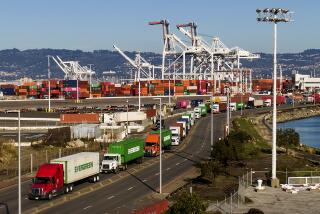Barley Unloaded After Farmers End Picketing
- Share via
Longshoremen began unloading New Zealand barley at the Port of Stockton late Wednesday after a group of protesting farmers withdrew a picket line they had maintained since Monday.
Unloading of the freighter, chartered by New York-based Continental Grain Co., was suspended after about two dozen members of the American Agricultural Movement (AAM) began demonstrating at the port. Members of Local 54 of the International Longshoremen’s and Warehousemen’s Union, citing “health and safety” provisions of their contract with the Pacific Maritime Assn., refused to walk past the pickets.
The farmers had charged that Continental was dumping the barley on the U.S. market at $10 a ton less than it had paid for it, in an effort to drive already declining barley prices even lower.
Representatives of AAM, which claims a membership of 150,000 full-time farm families in 34 states, met with Continental Grain officials Wednesday morning in Stockton and later announced the withdrawal of their protest for a week.
Continental spokesmen were unavailable for comment.
“We want to expose and try to do something about allowing these big grain companies to manipulate prices,” said David Senter, the movement’s national director. AAM’s argument, he emphasized, was with Continental, not New Zealand.
“I don’t believe New Zealand knew where the grain was going,” Senter said.
That view was echoed by New Zealand’s trade minister in Washington, David Kininmonth. The barley was sold by a growers cooperative, Farmlands Grain, at prevailing world prices, Kininmonth said.
The world price of $84 a ton is $20 less than the federally supported domestic price, according to the farmer group.
New Zealand has exported barley to the United States for the last two years, Kininmonth said, but the island nation offers its growers no production or export subsidies. It also maintains no barriers against importation of foreign-grown grain.
“The United States imports about 100,000 tons (of barley) a year,” he said. “We’re just trying to get a slice of that.”
In Washington, several congressmen from grain-growing states responded to news of the picketing by calling for stricter surveillance of importing practices. Rep. Glenn English (D-Okla.) appealed to President Reagan to invoke emergency powers to halt the importation. “Today barley, tomorrow wheat,” a spokesman for English said.
In Stockton, the Federal Grain Market News Service reported that barley prices have been falling for the last six weeks. “Users are well supplied at the present time,” a spokesman said, and prices on futures contracts continue falling.
Barley is selling for $5.20 to $5.25 per 100 pounds, the spokesman said, the same range that prevailed last week. The price fell from $5.35 to $5.40 a hundredweight before the arrival of the New Zealand grain, he added. California does not grow enough barley to supply its needs and traditionally brings it in from other states, noted Henry J. Voss, president of the California Farm Bureau Federation, the state’s largest organization of farmers and ranchers. The federation, Voss said, has “mixed feelings” about the situation but sees no evidence of unfair trade practices by New Zealand.
“We are for fair trade,” he said. “We cannot complain about other nations keeping our products out with artificial barriers if we turn around and do the same.” The federation, in contrast to AAM, maintains that federal subsidies price U.S. grains out of world markets by keeping uneconomic growers in production, adding to bulging global supplies.
More to Read
Inside the business of entertainment
The Wide Shot brings you news, analysis and insights on everything from streaming wars to production — and what it all means for the future.
You may occasionally receive promotional content from the Los Angeles Times.









